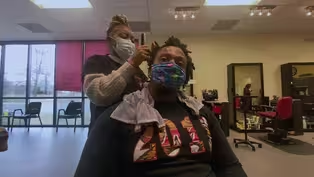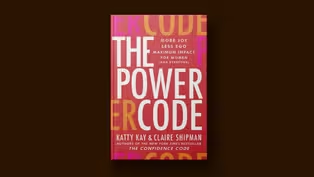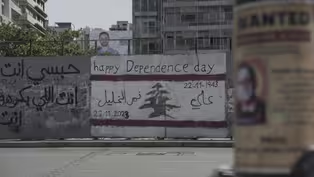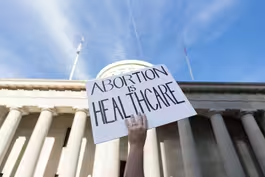
'Central Park Five' member on his historic city council race
Clip: 7/3/2023 | 6m 52sVideo has Closed Captions
Exonerated member of ‘Central Park Five’ on his historic city council primary win
In 1989, Yusef Salaam was one of five teenagers arrested and wrongly imprisoned after the brutal rape of a jogger in New York’s Central Park. They were exonerated in 2002 when DNA evidence linked another person to the crime. Now, some three decades later, Salaam has declared victory in a race for a New York City Council seat. Salaam joined Geoff Bennett to discuss the win.
Problems playing video? | Closed Captioning Feedback
Problems playing video? | Closed Captioning Feedback
Major corporate funding for the PBS News Hour is provided by BDO, BNSF, Consumer Cellular, American Cruise Lines, and Raymond James. Funding for the PBS NewsHour Weekend is provided by...

'Central Park Five' member on his historic city council race
Clip: 7/3/2023 | 6m 52sVideo has Closed Captions
In 1989, Yusef Salaam was one of five teenagers arrested and wrongly imprisoned after the brutal rape of a jogger in New York’s Central Park. They were exonerated in 2002 when DNA evidence linked another person to the crime. Now, some three decades later, Salaam has declared victory in a race for a New York City Council seat. Salaam joined Geoff Bennett to discuss the win.
Problems playing video? | Closed Captioning Feedback
How to Watch PBS News Hour
PBS News Hour is available to stream on pbs.org and the free PBS App, available on iPhone, Apple TV, Android TV, Android smartphones, Amazon Fire TV, Amazon Fire Tablet, Roku, Samsung Smart TV, and Vizio.
Providing Support for PBS.org
Learn Moreabout PBS online sponsorshipAMNA NAWAZ: After spending seven years behind bars for a heinous crime he didn't commit, Yusef Salaam is poised to help lead one of the world's most influential cities.
Geoff Bennett has our conversation.
GEOFF BENNETT: In 1989, a then-15-year-old Yusef Salaam was one of five teenagers arrested and wrongfully imprisoned after the brutal rape of a jogger in New York Central Park.
They were exonerated in 2002, when DNA evidence linked another person to the crime.
Now, some three decades later, Yusef Salaam has declared victory in a race for a New York City Council seat, the same city that once vilified him for a crime he did not commit.
Yusef Salaam joins us now.
Thank you for being with us.
YUSEF SALAAM (D), New York City Council Candidate: Oh, it's absolutely a pleasure to be here with you.
GEOFF BENNETT: And when you reflect on the arc of your life, from Rikers Island, where you were wrongfully imprisoned, now likely headed to City Hall as a city councilman, how does it strike you?
YUSEF SALAAM: I mean, it strikes me as the ultimate justice.
In faith and in faith communities, they always talk about when God restores, you get back 100 times what was taken.
And the beautiful thing about my story is that we can use it as really almost like a case study, a litmus test, the thing that teaches us that we have to hold on to faith, because we will never, never, never be misled by it.
GEOFF BENNETT: How will your experience dealing with the criminal justice system influence your approach to crime and policing and to social justice?
YUSEF SALAAM: Since the spike wheels of justice ran over me 34 years ago, of course, many people would imagine that I would have a very adverse reaction to police departments and police officers in general, really systemic issues.
And the great thing about my story is that I have met so many righteous actors in those spaces.
And so I'm not necessarily swayed by one polarization of the experience that I had over another.
The beautiful thing is that I know we have to occupy all spaces, right?
If we understand system and government, we understand that all politics is local.
And, in that local politics, in us being able to run and make sure that we have a fair chance, I have often said that those who have been close to the pain have to have a seat at the table.
And so the beautiful thing about my story is that I have been in pain.
I have been one of those people that was pushed behind, pushed to the back of the line.
And, as they always say, the last shall be first.
And so being able to not just march in the streets, but also have the opportunity to be one of those individuals who understands that, when others are marching in the streets, they need someone in the halls of power that can echo their voice, that can lift them up, that can carry them into those spaces, and be an advocate for them in the most powerful way.
GEOFF BENNETT: You won the primary as a Democrat.
You're expected to win the general election come November.
And your victory in this race is in many ways a clear rebuke of Donald Trump, who, back in 1989, took out full-page ads in major newspapers demanding the death penalty for you and the other four men now known as the Exonerated 5.
Defense attorney said that Trump's efforts played a major role in driving public opinion against you.
How do you feel about that now, especially in light of Donald Trump's own legal troubles right now?
YUSEF SALAAM: I often look at this story that the nation got a chance to really have a front seat to view.
Often, now I call it the love story -- or a love story between God and his people.
And, of course, the antithesis of that is like, OK, what about the other actors?
When we're fighting against injustice, we have to know beyond a shadow of a doubt that, in America, it may look black and white, but, in other parts of the world, sometimes it looks like people who are fighting against each other look the same way, right?
And so what I have understood is that we have the fight against spiritual wickedness in high and low places.
The juxtaposition is so beautiful, because we get an opportunity to see miracles happening right in front of our faces, get an opportunity to see what the justice system is supposed to look like, and what happens to Black bodies who, in a country where we want to be treated as equal, we want to we want equity, in fact.
But we still live in a very divided states of America that needs to be joined together.
Even in our communities, our home communities, our communities all around the country, we're moving as fragmented people, even though we're in community.
We need to come back together again to do the work of rebranding and rebuilding ourselves as first-class citizens, as opposed to second-class citizens.
No one of us have ever decided that for our lives, of course.
And now here we are on the cusp of really being able to see something different in my candidacy.
I have often said that the next person to assume the position of city council member will be the one who determines what the future of Harlem looks like.
And I think the future of Harlem is bright.
There's a lot of great things happening here.
And, man, I can't really wait to serve our people.
GEOFF BENNETT: Let me ask you about that, because Harlem has long been a crucible of New York City politics.
And you defeated the Democratic establishment that supported your well-funded rival.
What does your victory signal?
YUSEF SALAAM: My victory signals that we have had enough.
The challenge, I think, is trying to really understand, how is it that, as a people, we can pay taxes, but yet we see no investment in our community?
How can we pay taxes and we see no support, no services?
We, in fact, see slashes to the educational budget and things of that nature.
As a person who was in prison, we found out that the prisons are built based off of third- and fourth-grade reading test scores and math test scores, really all of the testing that is done in those -- in those really really crucial years.
And so they can predict how many jails to build based off of an individual's third- and fourth-grade test scores.
And our schools are failing public schools are failing us, right?
We deserve a great education for all of us.
Because why?
Because education is the passport to the future.
It gives us an opportunity to not only learn and produce, but also dig deep inside of ourselves, so that, psychosocially, we matter again.
That's how you produce real change.
Harlem was the place that beckoned everybody to come.
It was the first renaissance.
And to be able to produce a second renaissance of movement that really regalvanize us as a people is so necessary.
But to do it on purpose this time is really what I think matters.
That's where the movement is at.
GEOFF BENNETT: Yusef Salaam, thanks for your time and for your insights.
We appreciate it.
YUSEF SALAAM: My pleasure.
Thank you as well.
Cases of malaria transmitted in U.S. prompt concerns
Video has Closed Captions
Clip: 7/3/2023 | 6m 57s | First cases of malaria transmitted in U.S. in decades prompt concerns (6m 57s)
The effort to ban hairstyle discrimination nationwide
Video has Closed Captions
Clip: 7/3/2023 | 4m 38s | The effort to ban hairstyle discrimination nationwide (4m 38s)
Israel launches largest attacks on West Bank in 20 years
Video has Closed Captions
Clip: 7/3/2023 | 7m 27s | Israel military launches largest attacks on West Bank in nearly 20 years (7m 27s)
Katty Kay discusses book 'The Power Code' on women and power
Video has Closed Captions
Clip: 7/3/2023 | 6m 37s | Katty Kay discusses new book 'The Power Code' on women and power (6m 37s)
Lebanon struggles to emerge from economic crisis, corruption
Video has Closed Captions
Clip: 7/3/2023 | 9m 16s | Lebanon struggles to emerge from financial crisis and government corruption (9m 16s)
Ohio faces votes that could decide abortion access
Video has Closed Captions
Clip: 7/3/2023 | 6m 21s | Ohio faces critical votes that could decide abortion access in the state (6m 21s)
Providing Support for PBS.org
Learn Moreabout PBS online sponsorship
- News and Public Affairs

FRONTLINE is investigative journalism that questions, explains and changes our world.

- News and Public Affairs

Amanpour and Company features conversations with leaders and decision makers.












Support for PBS provided by:
Major corporate funding for the PBS News Hour is provided by BDO, BNSF, Consumer Cellular, American Cruise Lines, and Raymond James. Funding for the PBS NewsHour Weekend is provided by...





